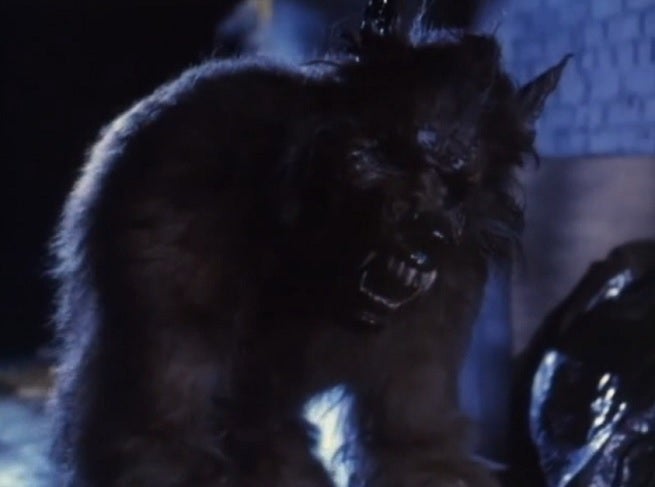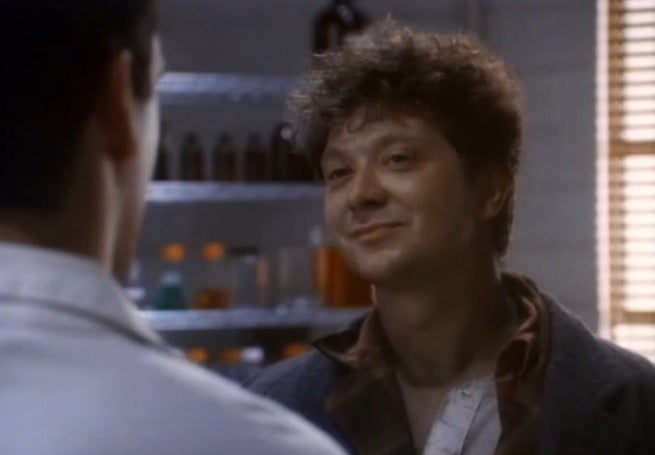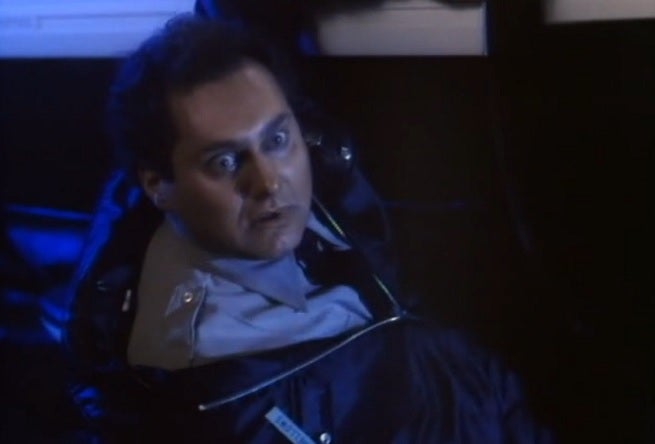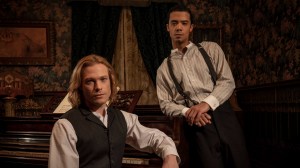This week: Is an old friend of Tina’s connected to some unethical experiments being conducted on homeless people? And why don’t the police seem to care?
Videos by ComicBook.com
Editor’s Note: We know we’re late! But we’ll be running twice weekly to catch up. Check back tomorrow for more!
The episode opens on Skid Row, where a group of homeless people hear a noise and go to investigate. They find one of their friends, dead and disfigured. They summon a police car, but the man is missing when the officers arrive, and the cops don’t believe their story.
At the police department, Father Michael — a priest — stops Barry on his way into work. He’s been waiting for two hours to talk to a lieutenant about missing homeless people in his parish. Barry walks Michael in to see the lieutenant, who dismisses it, saying that homeless people leaving the area doesn’t mean they’re missing. He says there will need to be bodies before he can assign more officers to watch the area. After Michael leaves, Lieutenant Garfield berates Barry for getting involved.
At a college, Tina is sitting next to an empty seat, watching a speech. Barry arrives late, apologizing. After the presentation, Tina introduces Barry to the speaker — her old friend, Carl. She and her husband were friends with him in college. Barry and Carl try to one-up each other in front of Tina, who is visbly awkward about it. Barry also moves on to asking him about the ethics behind his work (which is aimed at reversing aging and eliminating all disease), but Carl dismisses the notion.
Tina walks Carl outside, telling him to be careful since her husband was working on similar projects when he was killed. A homeless man approaches Carl outside, and Carl gives him a $20 bill, but tells Tina that he thinks the man was a waste of human life.
At the end of their walk home, Carl asks Tina whether she might have gone for him instead of her husband if he hadn’t left for a trip when they were all in school together. He kisses her, but she flees upstairs to her apartment.
In his lab, Barry laments the loss of Iris and Julio tries to encourage him to hook up with Tina. Barry shoots it down.
Later, a mob of angry homeless people are at the police station demanding an investigation into the disappearances. When the police start to get violent, one of the homeless men ends up with an officer’s gun. When Father Michael tries to talk him down, the man starts to ramble. Barry disarms him at super speed. After the crowd disperses, Barry agrees to bring Michael and two of the homeless men up to his lab to try and help them out.
The homeless men are the ones who found the disfigured body and was ignored by the police. He tells the story, saying that there’s someone going around at night, offering homeless people money and then sticking them with needles. Father Michael invites Barry to come check it out for himself.
[Flash Fact: One of the homeless men in this scene, named Charlie, is played by future Scandal standout Jeff Perry. Perry also appeared on Thirtysomething, a big hit around this time that Shipp referenced in our previous conversation.]
That night, we see the man with the needle up to his tricks. Bundled up so he’s not identifiable, he skulks around some corners but doesn’t make his move, because Barry gets to Charlie first, bringing groceries. Charlie brings him back to a kind of common area near a flophouse. Charlie isn’t appreciative of the food, but wants help. Barry can’t shake the feeling that he knows the man.
The needle man gets to another of the homless men, sticking him in his hand, and almost instantly the man’s hand begins to pulse with tumors and fluid. He dies screaming just as Barry arrives by his side as The Flash.
On a platform above and behind them, the needle man is revealed: It’s Carl.
At the morgue the next day, there are no odd symptoms in the man’s body,and he appears to have died of heart failure.
Barry figures out that he did know Charlie — in high school. He goes to Skid Row the next night to offer him a job and a place to stay.As he’s going in, Carl passes the pair on the street. Barry tries to talk Charlie into the job, which comes with a small place to stay and a hot plate. Eventually, Charlie relents and takes a job as a night watchman at the lab where Tina works. That night, Barry asks Tina out, but she has a date with Carl.
That night, between flirtations, he pumps her for information about The Flash. She still misses her husband. Carl asks to see her husband’s notes on genetic reorganization, but Tina says no. He insists that he’s close to something important, but his data is flawed and there might be something in David’s research that will help. She won’t give it to Carl since it was responsible for her husband’s death. He apologizes for asking.
He hands her a glass of wine as they head inside for dessert.
At Barry’s lab, Julio can’t find out what’s going on with the homeless man’s blood sample. Barry calls Tina, hoping to use S.T.A.R. Labs’ resources to figure it out. Her phone, of course, rings and rings as she’s been drugged and is unconscious. Hours later, she wakes up and Carl is still there, playing it off that she drank too much.
Later, he uses photos he took of Tina’s eyeball to get inside S.T.A.R. and past the security system.
Barry calls S.T.A.R. looking for Tina, and Charlie answers. He says she isn’t there, but then sees a security alert in Lab 7. Charlie hangs up on Barry, and Barry becomes concerned. In Lab 7, Carl has found David’s notes. He starts making copies when Charlie walks in looking for anything that might be wrong. Carl knocks him unconscious from behind, just as The Flash arrives.
In his haste to help Charlie, The Flash ends up trapped inside a tube with all the air being sucked out by an industrial vacuum. He uses his powers to escape, saving himself and Charlie, by vibrating a hole in the glass. Charlie is carried away on a stretcher.
Later, Tina arrives and finds some of her husband’s notes still on the copier bed. She puts two and two together and figures out someone was looking for her husband’s notes.
Elsewhere, Carl appears on the brink of a breakthrough because of something he sees in David’s notes. He starts to work on a new compound. Once he has it, he injects it into a German Shepherd and watches as the dog almost instantly grows and mutates. It becomes humanoid and breaks out of the lab.
At S.T.A.R., Barry and Tina argue about whether Carl might be the one killing the homeless people and whether Barry might be jealous of her relationship with Carl. They flirt with the idea of dissolving Team Flash and Barry storms out.
On the street, a pair of beat cops are trying to track down the mutated dog, which they believe to be a normal dog, just rabid. When they see it, they draw their guns and call for backup. Barry hears their call for backup while he’s driving around.
[Flash fact: The wolfman attack and call for backup happens at the corner of Gardner & Fox, named for Gardner Fox, the prolific comic book writer credited with creating the Jay Garrick version of The Flash.]
Barry arrives as The Flash, just in time to save one of the beat cops. As they stand there in a panic, a shotguntrained on the wolfman, it mutates back to the original dog. Barry, now in civilian clothes, takes it to S.T.A.R. to be examined.
At the lab, Tina confirms that the mutations he’s seeing in the dog’s bloodstream was based on her husband’s work; she apologizes for overreacting, and Barry tells her that Carl needs to be stopped. She tells him she’ll be waiting.
At Carl’s lab, he tries to convince The Flash of the nobility of his work, and threatens to blow up the lab if Barry tries to bring him in. He throws a bottle of volatile chemicals to distract The Flash, locks himself in a closet and injects himself with the drug, turning himself into a giant, monstrous-looking man.
He rampages briefly through the streets before collapsing in front of the police and pulsating like the homeless man did earlier.
[Flash Fact: This officer’s name is Tony Bellows. He recently appeared on The CW’s The Flash as the mayor.]
Carl reverts to his normal — but sore — self and runs off while Bellows tends to his injured partner.
Carl comes to S.T.A.R., asking Tina to help him hide out, but she’s furious that he killed innocent people. He says that his birth parents were “filth” who lived in a tenement, and that’s what gave him the idea to “cull the herd.” She says she can’t let him continue to use David’s notes to carry on his crazy experiments, but he hits her and goes into the lab.
At Carl’s lab, The Flash wakes up from having been knocked out earlier and calls S.T.A.T. but gets no answer as Carl is holding Tina hostage and treating himself with the serum again. She pleads with him to be reasonable, but instead he wants to stick her with the serum, too. The Flash shows up and stops him, but then Carl gets away after knocking The Flash down. He runs out on a rampage and barry chases after him.
Outside, Carl smashes up Skid Row, leading to a confrontation with The Flash. Ultimately, after Barry wraps him up in a chain link fence, Carl reverts to his normal size. Tina watches over him, and Barry walks in in his cop clothes. He holds Tina while other police arrive to take Carl into custody.
This episode is a weird one. We talked last time about how the relationship between Barry and Tina would flail between romantic and not, and this week there is clearly a little bit of something going on there, but both of them are too hung up in their own mission statement to deal with it.
What did Shipp have to say when we discussed the episode and some of its themes? Read on…
This time around, we don’t get a ton of relationship stuff and almost no references back to the pilot. I know you had said that they wanted every week to stand on its own — something that we’ve talked with the Constantine showrunner about still being an argument now when writers want to serialize.
It amazes me that that’s still an issue because Lois and Clark came in behind us and they almost had no superhero stuff going on; it was all about the relationship, and they lasted how many seasons? Smallville came in with very little. They were telling the story of the people; they were telling a human story, and that went for ten. So it’s clear that you’ve got to have that in order to keep pulling people in to come back next week, to find out what’s happening to these people that they’re feeling intimate with. It’s not enough to make a good stand-alone hour repetitively.
What do you remember about this episode in particular?
It’s so funny, becuase I’ll put in an episode now and I have no memory of shooting whatever scene I’m shooting.
I did recently see the first one [after the pilot], which is the one with the genetic experimenting on the homeless people, right? The friend of Tina’s?
That was when we had our first DP and we were really going for a CSI show with a superhuman element attached.
Which is interesting, because prior to the announcement of this version of The Flash, for four or five years at least I remember people saying that The Flash lends itself to exactly that.
Right, we were CSI before our time! But we found ourselves up against, for example, they promised me that “We won’t have you saving a kid from a burning building on Page Six of the script. It’s not going to be that kind of a show.”
Well, by the third episode, I was rescuing a kid from a burning building. Now, it was on Page Eleven, not Page Six, but it was right away that the network wantedt o see the suit and we wanted to keep it really sparing.
I had forgotten — I was going through my parents’ house recently in Atlanta and I found some old clippings. One of them said “The Flash lifts CBS in strong debut.” I’d forgotten because by the end it was such a struggle to find our audience, being moved, being pre-empted. But we debuted even in a difficult time slot to strong numbers. Whereas three or four million people now can make a show a hit, we had I think 17 million people tuning in to the last half-hour of our pilot.
But as a result of these things like being pre-empted by baseball immediately, suddenly instead of realizing that the problem was with the scheduling, they began to tinker with the show. It was always more, more, more. They wanted more comic book heroes and some people feel that the show was just hitting its stride by the end. I personally, although I loved working with Mark Hamill, [those episodes] were not indicative of the tone of our whole show. That was broadly comic, over the top, and it was fun to go there but that wasn’t the show I wanted to do every week. I wanted to do a smarter show, a darker show, a more adult-driven show.
We did get into something they said they weren’t going to get into which was supervillain of the week. Guest star David Cassidy, all that. Although I must say, the pilot I thought went really well. The first episode, I thought we obviously had not gelled back into our characters and it wasn’t until “Watching the Detectives” that I felt like I was in the role yet. That happened when I went into Megan Lockheart’s van and suddenly it came alive and I came alive and I suddenly began to go “Okay, we can go forward from here.”
The Barry from the pilot, I didn’t see a whole lot in evidence in this episode. It was almost like we had to start over again from scratch.
It almost felt like Barry solved his problem by muscling through it in a way that didn’t require a lot of thought.
Yeah.
Very early on, the guest stars that were in it and the cast that were supporting you are great actors.
Strong actors. Totally. And that’s thank you to April Webster. We had, really, a strong supporting cast from the beginning.
Do you feel like around the beginning, you had a more coherent vision, where the guest stars were there to drive characters, not to deliver eyeballs?
You’re exactly right.
And you had Clarence Clemons from the E Street Band!
Yes! [Laughs]
Check back for another Throwback Recap of The Flash tomorrow at 8 p.m. ET. We’ll be doing them twice weekly on Tuesdays and Wednesdays until we catch up with our original gameplan!











